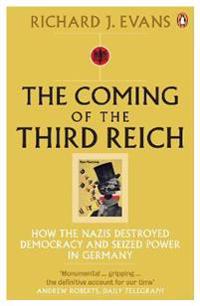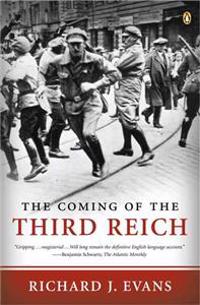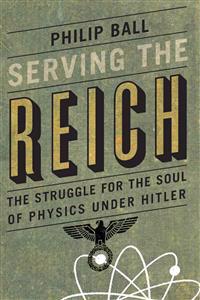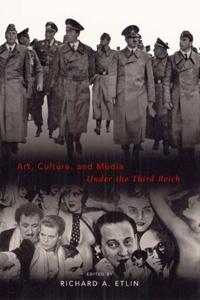The Coming of the Third Reich (Storpocket)
avRichard J. Evans
ISBN: 9780141009759 - UTGIVEN: 200408Richard J. Evans' "The Coming of the Third Reich: How the Nazis Destroyed Democracy and Seized Power in Germany" explores how the First World War, the Weimar Republic and the Great Depression paved the way for Nazi rule. They started as little more than a gang of extremists and thugs, yet in a few y[...]
The Third Reich in Power, 1933-1939 (Storpocket)
avRichard J. Evans
ISBN: 9780141009766 - UTGIVEN: 200605The second book in his acclaimed trilogy on the rise and fall of Nazi Germany, Richard J. Evans' "The Third Reich in Power: How the Nazis Won Over the Hearts and Minds of a Nation" explores how Hitler turned Germany from a vibrant democracy into a one-party state. Before Hitler seized power in 1933,[...]
The Third Reich at War (Storpocket)
avRichard J. Evans
ISBN: 9780141015484 - UTGIVEN: 200909The final book in his acclaimed trilogy on the rise and fall of Nazi Germany, Richard J. Evans' "The Third Reich at War: How the Nazis Led Germany from Conquest to Disaster" shows how Germany rushed headlong into destroying itself, shattering an entire continent. In 1939 Hitler mobilized Germany int[...]
The Coming of the Third Reich (Häftad)
avRichard J. Evans
ISBN: 9780143034698 - UTGIVEN: 200501The first in a three-volume series, a definitive history of Adolf Hitler's rise to power and the collapse of democracy in Nazi Germany explains why Nazism's ideology of hatred and racism found fertile ground in a country embittered by military defeat and economic disaster following World War I, unde[...]
The Third Reich in Power (Häftad)
avRichard J. Evans
ISBN: 9780143037903 - UTGIVEN: 200610Documents the radical and rapid transformation of Germany in its first year under Nazi rule, exploring how virtually every area of life, from the arts and religion to education and literature, was reordered to comply with the regime's preparations for the war, in an account that also describes the i[...]
The Third Reich at War, 1939-1945 (Häftad)
avRichard J. Evans
ISBN: 9780143116714 - UTGIVEN: 201002An absorbing, revelatory, and definitive account of one of the greatest tragedies in human history
Adroitly blending narrative, description, and analysis, Richard J. Evans portrays a society rushing headlong to self-destruction and taking much of Europe with it. Interweaving a broad narrative o[...]The Third Reich in History and Memory (Inbunden)
avRichard J. Evans
ISBN: 9780190228392 - UTGIVEN: 2015-03In the seventy years since the demise of the Third Reich, there has been a significant transformation in the ways in which the modern world understands Nazism. In this brilliant and eye-opening collection, Richard J. Evans, the acclaimed author of the Third Reich trilogy, offers a critical commentar[...]
Gestapo: Power and Terror in the Third Reich
ISBN: 9780191646676 - UTGIVEN: 2015-06The Gestapo was the most feared instrument of political terror in the Third Reich, brutally hunting down and destroying anyone it regarded as an enemy of the Nazi regime: socialists, Communists, Jews, homosexuals, and anyone else deemed to be an 'anti-social element'. Its prisons soon became infamo[...]
Life In The Third Reich (Pocket)
avRichard Bessel
ISBN: 9780192802101 - UTGIVEN: 2001-10-25The essays presented here aim to shed light on familiar topics - the role of political violence, the German view of Hitler, and also upon less well-known aspects of life in the Third Reich, such as village life, the treatment of "social outcasts", and the Germans' retrospective view.[...]
Theodor Fontane: Literature and History in the Bismarck Reich (Inbunden)
avGordon A. Craig
ISBN: 9780195128376 - UTGIVEN: 1999-11-01Writings on Music, 1965-2000 (Häftad)
avSteve Reich
ISBN: 9780195151152 - UTGIVEN: 200411In the mid-1960s, Steve Reich radically renewed the musical landscape with a back-to-basics sound that came to be called Minimalism. These early works, characterized by a relentless pulse and static harmony, focused single-mindedly on the process of gradual rhythmic change. Throughout his career, Re[...]
War and Economy in the Third Reich
ISBN: 9780198205999 - UTGIVEN: 1995-08This work examines the nature of the German economy in the 1930s and World War II. The essays explore the tension between Hitler's vision of an armed economy and the reality of German economic and social life.[...]
Royals and the Reich (Häftad)
avJonathan Petropoulos
ISBN: 9780199212781 - UTGIVEN: 2009-07The link between Hitler's Third Reich and European royalty has gone largely unexplored due to the secrecy surrounding royal families. Now, in Royals and the Reich, Jonathan Petropoulos uses unprecedented access to royal archives to tell the fascinating story of Queen Victoria's great-grandsons, the [...]
Refractions of the Third Reich in German and Austrian Fiction and Film (Inbunden)
avChloe E.M. Paver
ISBN: 9780199266111 - UTGIVEN: 2007-02-22Travels in the Reich, 1933-1945 (Häftad)
avMR J. J. Roberts
ISBN: 9780226006451 - UTGIVEN: 201210Even now," wrote Christopher Isherwood in his "Berlin Diary" of 1933, "I can't altogether believe that any of this has really happened." Three years later, W. E. B. DuBois described Germany as "silent, nervous, suppressed; it speaks in whispers." In contrast, a young John F. Kennedy, in the journal [...]
Resistance Against the Third Reich, 1933-1990
ISBN: 9780226069593 - UTGIVEN: 1994-12"The history of resistance affords a powerful example of why the present should try to remember a more distant, early modern past" write Michael Geyer and John W. Boyer in their introduction to Resistance against the Third Reich. Addressing the legacy of European resistance, this volume examines the[...]
Serving the Reich: The Struggle for the Soul of Physics Under Hitler (Inbunden)
avPhilip Ball
ISBN: 9780226204574 - UTGIVEN: 2014-10After World War II, most scientists in Germany maintained that they had been apolitical or actively resisted the Nazi regime, but the true story is much more complicated. In "Serving the Reich," Philip Ball takes a fresh look at that controversial history, contrasting the career of Peter Debye, dire[...]
Art, Culture and Media Under the Third Reich (Häftad)
ISBN: 9780226220871 - UTGIVEN: 200301"Art, Culture and Media Under the Third Reich" explores the way in which Nazi Germany used art and media to portray their country as a champion of "Kultur" and civilization. Rather than focusing strictly on the role of the arts in state-supported propaganda as other studies do, this volume reveals h[...]
Plastic Fantastic (Pocket)
avEugenie Samuel Reich
ISBN: 9780230623842 - UTGIVEN: 2010-04-27Highly regarded science journalist Eugenie Samuel Reich recounts the case of wunderkind physicist Jan Hendrik Schön, who faked the discovery of a new superconductor at the world famous Bell Laboratories. Many of the world’s top scientific journals and experts, including Nobel Prize-Winner[...]
Between Fear and Hope: Jewish Youth in the Third Reich (Inbunden)
avWerner Angress
ISBN: 9780231065986 - UTGIVEN: 1988-06-15Days of Masquerade: Life Stories of Lesbian Women During the Third Reich (Inbunden)
avClaudia Schoppmann
ISBN: 9780231102209 - UTGIVEN: 1996-07-25Function of the Orgasm (Häftad)
avWilhelm Reich
ISBN: 9780285649705 - UTGIVEN: 198908Reprint of Reich's first book today recognised as possibly his most important and pioneering work.


























